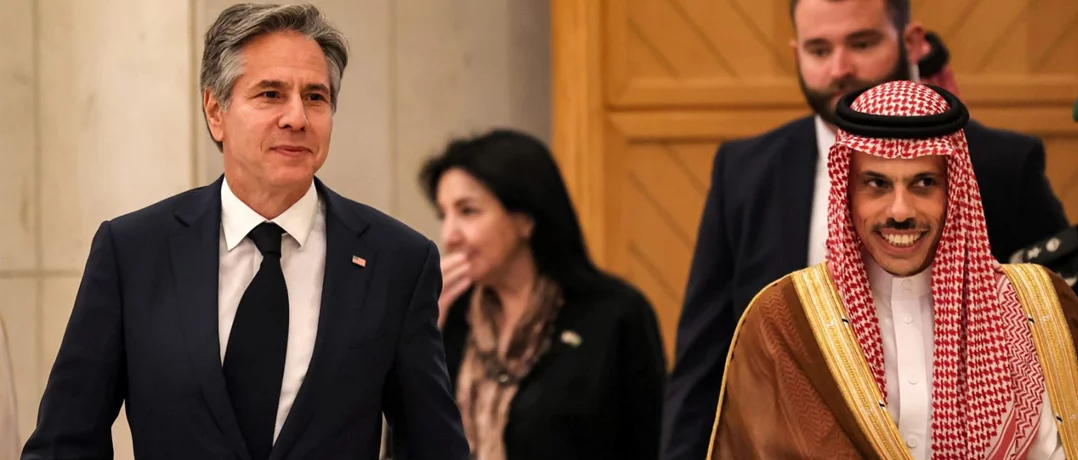Qatar’s decade-long balancing act, hosting Hamas while staying close to the U.S., is under strain, forcing it to rethink its role as a Middle East mediator.
Qatar’s balancing act between Washington and Hamas is reaching its limit
Qatar’s balancing act between Washington and Hamas is reaching its limit

In December 2023, as Israeli airstrikes pummeled Gaza and ceasefire talks teetered on collapse, a peculiar image emerged from Doha. Khaled Meshaal, a senior Hamas leader, was photographed sipping coffee outside his residence in the Qatari capital. Just weeks after the October 7 attacks that killed over 1,100 Israelis, here was one of Hamas’s most recognizable political figures enjoying a quiet moment in a country that also hosts the largest U.S. military base in the region.
It was more than a scene of daily routine; it was a snapshot of Qatar’s foreign policy in all its paradox. For more than a decade, Qatar has bet its security and international relevance on playing both sides. It shelters Hamas leaders while signing billion-dollar arms deals with Washington. It maintains channels with Iran while hosting the forward headquarters of U.S. Central Command. And for years, this balancing act worked. But after October 7, that fragile equilibrium is starting to crack.
Qatar’s posture isn’t born out of ideology but out of necessity. Small, gas-rich, and wedged between regional giants, the country has long pursued a policy of hedging: talking to everyone, offending no one too much, and leveraging access to actors others find too toxic to touch. This has allowed Doha to carve out a role as a high-stakes mediator.
After being expelled from Syria following the start of the civil war, Hamas found political refuge in Doha, making Qatar its most reliable partner. This dual role gave Qatar leverage no other actor could claim. It mediated truce agreements between Israel and Hamas in 2014, 2021, and 2022. It helped facilitate indirect communication between Hamas and Western intelligence agencies. Following October 7, it led talks that secured the release of over 100 Israeli and foreign hostages. For over a decade, Qatar aided the group politically and financially. Referring to data presented by the Israeli security cabinet, Qatar had donated $1.8 billion to Gaza since 2012, with the permission of the Israeli government. Additionally, Qatar was responsible for financing 60 percent and 45 percent of all aid to Gaza in 2019 and 2020, respectively.
At the same time, Qatar maintained warm relations with the U.S. In December 2013, Qatar and the United States signed a 10-year defense cooperation treaty, which led to the establishment of Al-Udeid Air Base. In 2014, Qatar purchased $24 billion worth of tanks and military hardware from the US and other European countries. Furthermore, Qatar and the US finalized a Communications Interoperability and Security Memorandum of Agreement (CISMOA) in 2016, followed by the most recent $1 billion agreements for Qatar to acquire counter-drone capabilities from the U.S. These agreements signify the strong cooperation between the two countries and highlight a heightened Qatari dependence on US hard security.
Now, that model is under strain. Those same ties that made Doha indispensable are now making it vulnerable. As Israel continues its military campaign in Gaza and American patience with regional ambiguity thins, bipartisan calls in Washington are pressuring Qatar to sever ties with Hamas altogether. Some Republican lawmakers have accused Qatar of harboring terrorists. Others demand a clear choice: us or them.
Reports suggest quiet discussions about relocating Hamas’s political office to another country, with Turkey or Algeria being potential candidates, though no decision has been made. According to the Foreign Ministry's spokesperson, Majed al-Ansari, “a decision to close down the office permanently is a decision that you will hear about from us directly and shouldn’t be part of media speculation.”
The calculus is shifting. Where Qatar’s ambiguity once offered diplomatic utility, now it risks being seen as complicity. Doha has long believed that providing a lifeline to Hamas was not a liability but a source of power. By being the only state that could talk to everyone, Qatar maximized its relevance. It pursued what scholars call a “hedging strategy,” while undergirding it with lavish humanitarian aid and soft power tools like Al Jazeera, World Cup diplomacy and massive global investments.
But shelter only works when the sheltered remains useful. The Taliban, for example, gave Qatar a diplomatic win when it hosted talks that led to the 2020 Doha Agreement with the U.S. This made the U.S. declare Qatar a major non-NATO ally in 2022.
Hamas, on the other hand, has become a reputational hazard. Qatar has limited leverage over the group’s military wing. Its mediators have at times been left scrambling as events on the ground outpace political negotiations.
Moreover, Qatar’s proximity to Hamas is drawing it closer to a conflict it cannot control. On June 23, 2025, Iran launched a barrage of rockets near Al Udeid, targeting U.S. assets in response to Israeli military operations. The attack missed its mark but sent a message: Qatar is not a neutral observer. It is a node in a web of regional antagonisms, specifically between Iran and the U.S.
This puts Qatar in a dangerous position. Hosting Hamas while housing U.S. troops invites pressure from both sides. Continuing to act as a mediator without sufficient distance from the conflict may diminish its credibility. Even Israel, which once viewed Qatar’s aid as a pragmatic way to keep Gaza stable, is questioning Doha’s utility.
None of this is to say that Qatar’s policy has failed. On the contrary, for over a decade, it elevated Doha’s status from a peripheral Gulf monarchy to a central player in Middle East diplomacy. Its gamble on political Islam gave it influence in Egypt (briefly), Libya, and Syria. Its open-door diplomacy made it a frequent host for negotiations no one else wanted to hold. And its massive wealth allowed it to finance those ambitions without domestic sacrifice.
But the regional context is changing. Saudi Arabia and the UAE have moved decisively away from political Islam. Egypt has reasserted itself as the default Gaza interlocutor. The U.S. is increasingly wary of states it perceives as playing both sides. In this environment, Qatar’s once-savvy ambiguity is beginning to look like strategic overreach.
Doha now faces a hard choice: double down on its role as an intermediary or recalibrate and distance itself from groups like Hamas. Both paths carry risk. Ejecting Hamas could close one of the last viable channels for talks. But keeping them could lead to further alienation from Qatar’s primary security guarantor, Washington.
There is no easy way out. But if Qatar wants to preserve its role as a broker of peace rather than a patron of pariahs, it may need to make the kind of strategic pivot it has so far avoided. The luxury of talking to everyone is fading. In today’s Middle East, where lines are hardening and alliances are tested by fire, sitting on the fence no longer ensures survival.
For a small state, that is a dangerous place to be.


